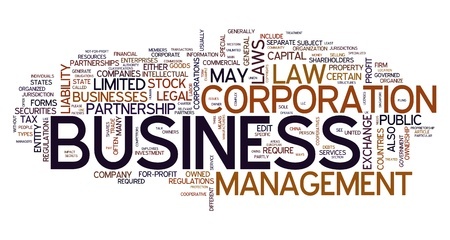
- Situations where you may not need to hire a lawyer
- Situations when you definitely should be at least talking to a lawyer
- The different types of lawyers, pricing structures, and firms that you may want to consider
- Questions that you should ask yourself, as well as questions to ask the lawyer you are thinking about hiring
So let's just go ahead and dive in.
Do you really even need a small business lawyer for your online business?
So many online entrepreneurs think that they don't need a lawyer to help them with their online business. And you know what?
They are probably right.
The truth is that most online entrepreneurs will never need a lawyer. Why is this? Because most online entrepreneurs fall into one of several camps:
- They have created a hobby business. That means that they aren't really serious about their business. They are dreamers and really want to believe that they can make millions online, but at the end of the day, they are just pursuing an expensive hobby. If this is you, you probably don't need to spend the money to hire a lawyer.
- They have a business that doesn't make any money. Not surprisingly, many businesses that are hobby businesses don't actually make any money. In fact, they probably lose money. Whether or not you can take those losses on your tax return is an entirely different issue (and I would recommend discussing that issue with your tax accountant), but if you can't afford to pay your normal bills, how are you going to pay for a lawyer?
- They have a descriptive or generic name. Any business that is serious about protecting it's intellectual property must also be serious about its name. A descriptive or generic name, such as “Joe's Apple Stand” (which is an apple stand run by a guy named Joe), is not capable of being trademarked. This is considered a descriptive name, and the more descriptive your name is, the less likely it is that you will be able to trademark it. And if you can't trademark it, why waste the time and money to register it or hire a lawyer to do so? You shouldn't – so you don't need a lawyer to protect your intellectual property.
- They are comfortable handling their own legal work. Believe it or not, there are a small subset of business owners that are capable and willing to handle their own legal work. In my opinion, this is foolish and ill-advised, but people do it anyway. If you fall into the class of folks that are unwilling to take advice from a lawyer and would rather do the work yourself, then have at it – you probably don't need to hire a lawyer (Not yet, anyway).
“He who represents himself has a fool for a client.” – Abraham Lincoln
Now that we have covered the folks that don't need a lawyer, what about those individuals that do? Here's a list of people that, in my opinion, should strongly consider getting a small business lawyer.
When to Hire a Lawyer for Your Online Business?
Here is a shortlist of people that would be well-advised to hire a lawyer to handle the legal needs of their online business.
- Plans for big growth. Anyone that has BIG PLANS for their business really needs to talk to an attorney. By big plans, I mean someone that is looking to change or revolutionize an industry, or who is looking to go national or global with their brand and anticipates multiple seven figures in revenue when everything is said and done.
- Considering outside funding. Outside funding could mean structured debt or private investors. In this case, you are getting into extremely complex securities laws (both state and potentially federal regulations), which carry criminal penalties if they are violated. If you don't want to end up in jail – talk to a lawyer and invest the money it takes to get your offering done correctly.
- Artful and fanciful names that need protection. If you have developed a unique and innovative brand, you will want to make sure that you have protected it. Getting your intellectual property in order with an experienced IP lawyer is the best way to do this.
- Generating over $25,000 per month in gross revenue. $25k is an arbitrary number. Maybe the number should be $10k or 50k – it doesn't really matter. What matters is that your are generating some cash, and hopefully there is some profit left over after expenses are paid. Once you start systematically generating cash, you need to bring on an attorney to handle an assortment of issues for you.
- Quickly opening multiple businesses or brands. If you are quickly opening multiple businesses or brands, chances are you are planning for big growth and are generating some money. It is a waste of time for you to do all the legal work to open up these companies and brands. Get a lawyer on retainer and have them do it for you.
- Is it too late? Many people wait until it is too late to hire a lawyer. This means they have just gotten sued, have received a cease and desist letter, or maybe you just found out that you are infringing on someone else's intellectual property. Don't wait until it is too late. Lawyers are trained to help you stay out of these problems. Talk to someone now.
Things to consider when hiring a small business lawyer
If you have decided that it is probably worth your while to talk to a lawyer, then here are three considerations you need to think about before you write that big check:
- What do you need a lawyer to do for you?
- What type of pricing model are you looking for?
- What type of firm do you want to use?
We'll take these one at a time.
What do you need the small business lawyer to do for you?
There are lots of different lawyers for lots of different situations. Here are just a few of the different legal areas that you may need a lawyer for: basic business formation, trademark/copyright, filing a patent, litigation (i.e. defending you from that lawsuit you received), or zoning/real estate issues (if you have a bricks and mortar business).
Very few lawyers are capable of handling all of these issues for you. A litigation lawyer, for example, may not deal in business formation issues (and vice versa). Also, many patent lawyers do not handle trademarks or copyrights. Some firms may handle more than one of these areas, but more and more these days, lawyers are specializing in one area of the law or another.
Here is a quick rundown of when certain lawyers may be needed:
A litigation lawyer is needed if you get sued. They may have other lawyers at their firm that handle business formation or trademark issues, but it will depend on the size of their firm.
A business lawyer may handle all issues related to business formation and choice of entity questions. They may also handle trademark and copyright issues. Rarely would they file a patent for you.
Patent lawyers typically only file patents. Lawyers must have certain credentials and pass a special exam to practice before the “patent bar.” Some of these lawyers will litigate patent issues, but this will vary by firm and attorney.
Real estate and zoning lawyers typically stick to this practice area, and don't do too much with business or intellectual property (trademark/copyright) work. Again, this is a broad generalization and may vary by firm or attorney.
Tax attorneys typically stick to tax work. Many business, real estate, and patent lawyers steer clear of tax work and will refer this work to another lawyer or accountant due to the constantly changing nature of federal and state tax laws.
Different Pricing Models for Legal Services
Once you have made the decision to hire a lawyer, you need to consider the different options available to pay for legal services. There are three main options available to pay for legal services.
- Hourly Billing. This is the most common method of paying for legal services. In this situation, you pay a big check over to the firm up front, and then they bill you by the hour for the legal work. Depending on whether a partner or associate is working on your file, you can expect to pay between $250-$450 per hour for legal work. Paralegals also bill by the hour, usually between $75-$150 per hour. Additional fees, such as postage, copies, etc. may also be tacked onto your bill. Expect to shell out at least $2,500-$5,000 up front to hire an hourly billing lawyer, and don't be surprised if you receive another bill for a similar amount a few months later.
- Flat Fees. More and more law firms are now charging flat fees for legal services. This means you pay them a one-time fee for legal work. The benefit to this arrangement is that you can contract for a lawyer to handle a discrete legal matter for you (such as forming a corporation or filing a trademark), but there is no ongoing relationship with that lawyer or firm. Also, some firms charge a flat fee to file a trademark, but if the mark is denied or additional work is required, they will bill you by the hour to handle that additional work.
- Subscription Model. This is a relatively new way to pay for legal services. Many firms don't like this approach because the firm is essentially financing the cost of legal services over the course of a set period of time, such as a year. But to the client, this can be a great deal because you know in advance what your legal fees will be and you don't have to worry about any surprises coming down the pipe. It also fosters a true relationship between the lawyer and the client. The lawyer has an incentive to build a relationship with the client and become a trusted member of the client's team. The client, in turn, has a trusted advisor that they can turn to with questions without worrying about getting a huge bill at the end of the month. This is the model we use here at Hawthorn Law.
The pricing model you negotiate is going to vary in large part on the type of firm you hire. Bigger firms have lots of overhead and the lawyers don't have as much discretion to charge innovative fees, such as a subscription-based fee. Even some small and mid-size firms are stuck with an “old school” mindset and will be leary to charge something outside the norm.
Questions you should ask yourself and the lawyer
So as you venture forth into the project of selecting a lawyer for your online business venture, here are a couple of questions you should consider.
First – Can you afford the lawyer? Going back to the beginning of this article, if your business isn't making any money, do you really want to seek much needed startup funds into the hiring of a lawyer?
Second – Are you seeking investors? If so, it's a no brainer – you need to call an attorney immediately to make sure you don't end up in jail.
Third – Do you want to work with a big firm, or is a smaller firm more your style? This is a matter of taste, personal preference, and budget. The bigger the firm, the more expensive the lawyer.
What about questions to ask the lawyer?
Here is a quick list of questions you should ask any small business lawyer you are considering hiring:
- What type of clients do you work with? You are looking to determine whether the attorney works with clients in a number of different fields, or whether the attorney primarily helps online businesses and entrepreneurs (As we do here at Hawthorn Law).
- What is your approach to the law? At Hawthorn Law, we pride ourselves in giving away virtually 100% of what we do. We aren't holding anything back. We are teachers and we want to coach our clients through the process of building an online business the right way and protecting their online brands. We will analyze and critique your legal options or you so that you can make the best decisions for your business.
- How do you bill? As discussed previously, here at Hawthorn Law, we work on a subscription based model. Our clients sign an annual contract and make payments on a monthly basis, just as you would with any other software-based service agreement. We ask for a 12-month commitment because much of our work is front loaded in the first few months of representation.
- Do you litigate? Many firms do litigate, but at Hawthorn Law, we do not. We do maintain relationships with a number of litigation firms and are happy to provide referrals as needed.
The final and probably most important question you should ask any lawyer you are considering hiring is this…
Do you like the lawyer?
This is someone that you are bringing on to be an invaluable component of your business team. This is someone that you will be talking to regularly about sensitive legal matters. You need to make sure you like this person.
If you do like them, and you are growth oriented and looking to build a long-lasting company, then pull the trigger and hire that lawyer.
As always, if you have any additional questions about Hawthorn Law or want to know whether we are a good fit for your business, please feel free to contact us to schedule a strategy session.
**Limited Time Offer** If you have read this far, chances are you have some legal considerations that you may need to address in your business. Lucky you – I just launched an online training course to teach you all the basics you need to know to get your legal house in order. Just click here, enter your name and email, and I'll send you the first video immediately.
Other Online Resources
When to Hire a Lawyer for Business Matters (and when to Do it Yourself)! (SBA)
When Do I Need a Business Lawyer for My Small Business? (FindLaw)
How to Hire an Attorney (Entrepreneur.com)
Internet Business: Selecting a Good Lawyer (Lawyers.com)
What Start-ups Should Know About Hiring a Lawyer (Forbes)






I agree that it is important to hire a lawyer you actually like and get along with. You made a good point when you said that you will likely be talking to this person often, and about sensitive topics. I know that I would want to work alongside people I trust and respect, so this would be a deciding factor for me.
Thank you Kairi – Having a good working relationship is SO important for both the lawyer and the client.
Jim
It’s good to learn about hiring a business lawyer. I didn’t know that there were so many different price structures, like hourly billing and flat fees. The subscription model sounds like a great idea, since it can save money over the long run. I don’t have a business or anything, but this is still good to know.